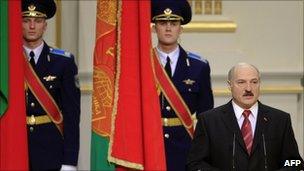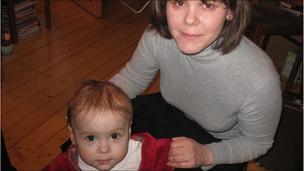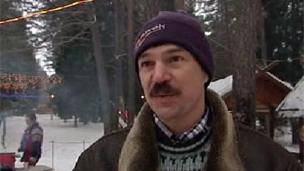Belarus faces renewed isolation over crackdown
- Published

Belarus President Alexander Lukashenko is facing EU sanctions after detaining opposition politicians
The EU is expected to impose sanctions on President Alexander Lukashenko of Belarus on Monday, because of his continuing detention of four opposition candidates following December's election night violence in the capital, Minsk.
They are due to stand trial early next month and could face up to 15 years in prison. After a thaw in relations between the former Soviet state and the EU, Western diplomats are now speaking of a long, deep, diplomatic freeze.
Milana Mikhailevich has not seen her husband, Alexei, for more than a month.
On 19 December last year, he was a presidential candidate. By the following morning, he was a prisoner, detained with other opposition leaders.
The official reason given for their arrests was violence at a march in Minsk, in protest at Mr Lukashenko's fourth landslide victory.
Since Alexei has been in prison, Milana has received a couple of strange phone calls from him. During one, he begged her to keep silent, unless she didn't hear from him again within a week. He never called and she began to contact the media.
She has been contacted herself, by the organisation still known in Belarus as the KGB.
'Double standards'
The officers told her to be grateful they had not smashed down the door. Then they searched the flat where she lives with her two daughters.
It made quite an impression on her one-year-old, Alyona.
"She's begun playing a game we call KGB search," Milana told me. "She takes out all the papers she can find, looks through them and throws them over the floor. It's funny… but it's sad at the same time."
When I met Foreign Minister Sergei Martynov he would not be drawn on why the families were not being given access to the prisoners, but he did have a strong view on the EU's plans to impose a travel ban on Mr Lukashenko and his entourage.

Milana Mikhailevich says the KGB search has had an impact on her daughter
"Don't ascribe to Belarus things we didn't do. There were no deaths, no gunfire, no water cannon. The European Union has double standards," he said.
If you head to the west of Belarus, where the EU has its eastern frontier, the detentions and diplomatic deep-freeze seem very far away - but the consequences are not.
A 50km-wide stretch of the country along the border with the EU has long been designated a visa-free zone.
But now those plans to allow the citizens of Lithuania, Poland and Latvia to enter the country freely - and Belarusians to go the other way - are coming under threat.
Autocratic instincts
At a winter festival in celebration of Zyuzya, the Belarusian spirit of the cold, I found that the chill in relations with the West does worry people who have been counting on tourist income to raise their living standards.

Some in Belarus believe their country turns more towards the EU than Russia
Not that too many Belarusians complain about what they have - at least not to us, and not in public.
Nor do they tend to blame their longtime leader Mr Lukashenko, whose autocratic instincts have, to the surprise of many, so abruptly driven a wedge between Belarus and the West.
In the rural parts of the country, they pay more attention to the low prices and low levels of unemployment he has managed to maintain, than what are widely held to be low levels of democracy.
Standing in the village of Parizh, or Paris - given its name after Napoleon stayed there on his way to Moscow - the deputy head of the local administration, Alla Keizik, says she has seen the relationship with the EU wax and wane over the years.
She has a plea for the European Union, as it considers new sanctions against her country's leadership. "I hope there are some wise heads in the EU who will realise what the will of the people is," she says, "even if the outcome is something they don't like."
She was speaking in front of a smaller, less elaborate version of the Eiffel Tower, built by a local priest to give the village a more European feel.
But just a few miles away, outside Alla's office, there is a different kind of iconic structure - a statue of Vladimir Lenin.
Belarus, as one local woman told me, "is a border state, with a border mentality. It will always be between Europe and Russia."
- Published18 December 2010
- Published4 October 2010